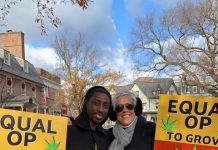Ed Weidenfeld, a prominent D.C. lawyer, former general counsel for Ronald Reagan’s presidential campaign, and advisor to five other presidents, is the co-founder of Phyto Management LLC in Washington, D.C., which produces and sells medical cannabis under the brand “District Cannabis”. He’s also the co-founder of a new Maryland-based medical cannabis venture, Maryland Cultivation and Processing, which is located in Hagerstown.
CBMD: Would you explain the unique path that led you to the medical cannabis industry?
Ed Weidenfeld (EW): In the beginning, I was somewhat skeptical about the benefits of cannabis and concerned that it was a gateway drug. I worked with President Reagan’s administration and had tremendous admiration for him and Mrs. Reagan, who embraced the “Just Say No” movement. At first, I agreed with her position, but I very quickly began to worry that it wasn’t the danger of cannabis that was the motivation, but rather the desire to exert social control over members of minority groups. I had no real interest in cannabis until I was diagnosed with Parkinson’s disease and started reading the literature about how cannabis could help patients manage some of the symptoms of the disease, which is treatable but not curable. I asked my neurologist about the benefits of cannabis. He was very skeptical but then said I could try it if I could find out where it came from and assure myself that the cultivator took the utmost care to produce a pure, clean product. So, through my son, I got connected with master grower, Andras Kirschner, and we got a license in Washington D.C. to produce and sell medical cannabis and one in Maryland. We had our license for in D.C. for about four years before we opened our operation 18 months ago. Our operation in Maryland is set to open this summer. The first phase of construction is our warehouse. Then we’ll build our 45,000 square foot, state-of-the art, glass roof “Dutch” greenhouse.
“I worked with President Reagan’s administration and had tremendous admiration for him and Mrs. Reagan, who embraced the ‘Just Say No’ movement. At first, I agreed with her position, but I very quickly began to worry that it wasn’t the danger of cannabis that was the motivation, but rather the desire to exert social control over members of minority groups.”
Edward Weidenfeld
CBMD: Would you tell us how your personal use of cannabis for your Parkinson’s has affected your symptoms and your quality of life?
EW: There’s no question, it’s improved my quality of life. First, there is a terrible stiffness in the joints and cramping of the muscles that you have with Parkinson’s. Cannabis is a great anti-inflammatory. I tend to take it for the cramping by tincture under the tongue. Second, there is a phenomena with Parkinson’s called night terrors, where you have terrible nightmares that you act out.
The only medication that I found that relieves the night terrors is cannabis and it allowed me to cut way down on the clonazepam I had been prescribed. I also experience a very high level of anxiety about my health. I tried all kinds of anti-anxiety drugs, all of which left me in a fog. They cut back on the anxiety but they cut back on the sensations of the moment whereas cannabis lets you focus on the moment without worry about what’s coming next. So, whether it’s a social conversation, listening to music or admiring art or even talking family affairs, I’m able to relax and focus on the moment without having to cut off all sensations by using medical cannabis to manage anxiety.
CBMD: Tell us about your new operation in Hagerstown.
EW: Our new facility will be constructed in stages so that it can be expanded as demand increases. But I think as good as the design of the facility is, the differentiating factor between our operation and others is the quality of the staff. We have trained agronomists, who have sustainable agriculture degrees, as well as people who don’t have degrees but have years of experience in states where there has been an opportunity to legally cultivate cannabis. Many have come from California. I think the other differentiating factor is when you talk to the cultivators about what they look for they all say they listen and the plants tell them what their needs are. So, we listen to the plants. The quality of the product depends on the best inputs at every stage, beginning with the best flower, the best strains, and the best staff. This is medicine that requires precision and attention from moment to moment, let alone day to day. And that’s what we give our plants.
CBMD: How many people will the operation in Hagerstown employ?
EW: We’re estimating maybe 35 to start. We’ve been attending job fairs in Hagerstown and have been impressed with the quality of potential employees we’ve been meeting. We’ll also probably transfer one or two people from the Washington operation.
CBMD: What advice do you have for someone who may be just like you were? (beholden to that “Just Say No” mentality) How should they consider cannabis for their own best health and possibly a business venture?
EW: It’s hard to believe there are still “just say no” advocates in light of all we know about the benefits of this plant. If someone’s mind is closed, I take them to a licensed dispensary with a comfortable waiting room and we watch the customers. A cross-section of America passes through the room. Washington is a political town, so among the patients are “talking heads” of all political stripes and administrations.
A patient with a health issue must not risk aggravating the condition with illicit cannabis of unknown origin. Toxins, adultrates, fungus, mold and heavy metals are commonly found in unregulated and illicit markets. I found many others seeking the comfort of a regulated market. After meeting a brilliant horticulturist who understood cannabis and shared my concern for consistent quality, the combination of opportunity, service and playing the hand I was dealt the best I can, led me to cannabis as a business.










